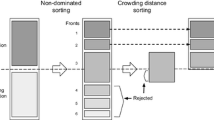Abstract
Based on the uncertainty theory, this paper studies the uncertain bi-objective UAV mission allocation problem in uncertain environment. Firstly, by regarding uncertainty factors in the mission allocation planning as uncertain variables and considering two missions of combat mission gains and flight fuel consumption, a uncertain bi-objective UAV mission allocation (UBUMA) model is established. Secondly, in order to overcome the disconnection between the objective functions caused by the traditional method to deal with uncertain factors, this paper proposes a so-called uncertain method to solve UBMUA problem by defining the relationship of order between uncertain variables. According the real decision-making process, the UBUMA is transformed into a single-objective programming problem by using \(C_E\) principle relation. Finally, the ant algorithm is employed to solve the single-objective programming problem and then the \(C_E\) efficient mission routes are obtained. The simulation results show that this method can effectively deal with UBUMA problem, and the mission allocation efficient routes is reasonable.



Similar content being viewed by others
Explore related subjects
Discover the latest articles and news from researchers in related subjects, suggested using machine learning.References
Alotaibi ET, Saleh AS et al (2019) LSAR: multi-UAV collaboration for search and rescue missions. IEEE Access 7:55817–55832
Chen X, Tang T (2013) Study on the dynamic task assignment of multi-UCAV under dynamic uncertain environment. Fire Control Command Control 38(1):45–53
Cristian RA, David C (2019) Constrained multi-objective optimization for multi-UAV planning. Decis Control 10(6):2479–2496
Fu Z, Mao Y et al (2020) Secure multi-UAV collaborative task allocation. IEEE Access 7:35579–35587
Gao J, Yao K (2015) Some concepts and theorems of uncertain random process. Int J Intell Syst 30(1):52–65
Gong Z, Wang H (2020) Measuring trust in social networks based on linear uncertainty theory. Inf Sci 508:154–172
Liu B (2007) Uncertainty theory, 2nd edn. Springer, Berlin
Liu B (2009) Some research problems in uncertainty theory. J Uncert Syst 3(1):3–10
Liu B (2012) Why is there a need for uncertainty theory. J Uncert Syst 6(1):3–10
Wang X, Xu J, Zheng M et al (2015) Aviation risk analysis: U-bowtie model based on chance theory. IEEE Access 7:86664–86677
Wang Z, Guo J, Chen J, Tian S (2019a) Uncertain team orienteering problem with time windows based on uncertainty theory. IEEE Access 7:63403–63414
Wang Z, Guo J, Zheng M (2019b) Research on a novel minimum-risk model for uncertain orienteering problem based on uncertainty theory. Soft Comput 23(12):4573–4584
Yao K, Liu B (2018) Uncertain regression analysis: an approach for imprecise observations. Soft Comput 22(17):5579–5582
Yao K, Gao J, Gao Y (2013) Some stability theorems of uncertain differential equation. Fuzzy Optim Decis Making 12(1):3–13
Zhang Y, Hu B et al (2016) Research on unmanned aerial vehicle (UAV) Reconnaissance decision in multi-mission area under uncertain environment. J Northwest Polytech Univ 34(6):1028–1034
Zhang J, Xing J et al (2020) Cooperative task assignment of multi-UAV system. Chin J Aeronaut 33(11):2825–2827
Zheng M, Yi Y (2018) The information value and the uncertainties in two-stage uncertain programming with recourse. Soft Comput 22(17):5791–5801
Zheng M, Yi Y, Wang Z et al (2016) Efficient solution concepts and their application in uncertain multiobjective programming. Appl Soft Comput 56:557–569
Author information
Authors and Affiliations
Corresponding author
Additional information
Publisher's Note
Springer Nature remains neutral with regard to jurisdictional claims in published maps and institutional affiliations.
This work was supported by the Natural Science Foundation of Shaanxi Province of China under Grant 2019JM-271.
Rights and permissions
About this article
Cite this article
Zhang, L., Zheng, M., Zhong, H. et al. Research on uncertain bi-objective UAV mission allocation problem. Evol. Intel. 17, 229–237 (2024). https://doi.org/10.1007/s12065-021-00670-2
Received:
Revised:
Accepted:
Published:
Issue Date:
DOI: https://doi.org/10.1007/s12065-021-00670-2




